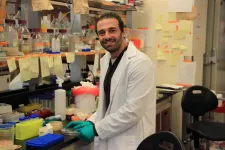Keeping it fresh: New AI-based strategy can assess the freshness of beef samples
Scientists combine spectroscopy and deep learning in an efficient technique for detecting spoiled meat
2021-04-01
(Press-News.org) Although beef is one of the most consumed foods around the world, eating it when it's past its prime is not only unsavory, but also poses some serious health risks. Unfortunately, available methods to check for beef freshness have various disadvantages that keep them from being useful to the public. For example, chemical analysis or microbial population evaluations take too much time and require the skills of a professional. On the other hand, non-destructive approaches based on near-infrared spectroscopy require expensive and sophisticated equipment. Could artificial intelligence be the key to a more cost-effective way to assess the freshness of beef?
At Gwangju Institute of Science and Technology (GIST), Korea, a team of scientists led by Associate Processors Kyoobin Lee and Jae Gwan Kim have developed a new strategy that combines deep learning with diffuse reflectance spectroscopy (DRS), a relatively inexpensive optical technique. "Unlike other types of spectroscopy, DRS does not require complex calibration; instead, it can be used to quantify part of the molecular composition of a sample using just an affordable and easily configurable spectrometer," explains Lee. The findings of their study are now published in Food Chemistry.
To determine the freshness of beef samples, they relied on DRS measurements to estimate the proportions of different forms of myoglobin in the meat. Myoglobin and its derivatives are the proteins mainly responsible for the color of meat and its changes during the decomposition process. However, manually converting DRS measurements into myoglobin concentrations to finally decide upon the freshness of a sample is not a very accurate strategy--and this is where deep learning comes into play.
Convolutional neural networks (CNN) are widely used artificial intelligence algorithms that can learn from a pre-classified dataset, referred to as 'training set,' and find hidden patterns in the data to classify new inputs. To train the CNN, the researchers gathered data on 78 beef samples during their spoilage process by regularly measuring their pH (acidity) alongside their DRS profiles. After manually classifying the DRS data based on the pH values as 'fresh,' 'normal,' or 'spoiled,' they fed the algorithm the labelled DRS dataset and also fused this information with myoglobin estimations. "By providing both myoglobin and spectral information, our trained deep learning algorithm could correctly classify the freshness of beef samples in a matter of seconds in about 92% of cases," highlights Kim.
Besides its accuracy, the strengths of this novel strategy lie in its speed, low cost, and non-destructive nature. The team believes it may be possible to develop small, portable spectroscopic devices so that everyone can easily assess the freshness of their beef, even at home. Moreover, similar spectroscopy and CNN-based techniques could also be extended to other products, such as fish or pork. In the future, with any luck, it will be easier and more accessible to identify and avoid questionable meat.
INFORMATION:
About Gwangju Institute of Science and Technology (GIST)
Gwangju Institute of Science and Technology (GIST) is a research-oriented university situated in Gwangju, South Korea. One of the most prestigious schools in South Korea, it was founded in 1993. The university aims to create a strong research environment to spur advancements in science and technology and to promote collaboration between foreign and domestic research programs. With its motto, "A Proud Creator of Future Science and Technology," the university has consistently received one of the highest university rankings in Korea.
Website: http://www.gist.ac.kr/
About the authors
Kyoobin Lee is an Associate Professor and Director of the AI laboratory at GIST. His group is developing AI-based robot vision and deep learning-based bio-medical analysis methods. Before joining GIST, he obtained a PhD in Mechatronics from KAIST and completed a postdoctoral training program at Korea Institute of Science and Technology (KIST).
Jae Gwan Kim is an Associate Professor at the Department of Biomedical Science and Engineering at GIST since 2011. His current research topics include brain stimulation by transcranial ultrasound, anesthesia depth monitoring, and screening the stage of Alzheimer's disease via brain functional connectivity measurements. Before joining GIST, he completed a postdoctoral training program at the Beckman Laser Institute and Medical Clinic at UC Irvine, USA. In 2005, he received a PhD in Biomedical Engineering from a joint program between the University of Texas at Arlington and the University of Texas Southwestern Medical Center at Dallas, USA.
[Attachments] See images for this press release:

ELSE PRESS RELEASES FROM THIS DATE:
2021-04-01
A study by KAIST researchers revealed that an ionized gas jet blowing onto water, also known as a 'plasma jet', produces a more stable interaction with the water's surface compared to a neutral gas jet. This finding reported in the April 1 issue of Nature will help improve the scientific understanding of plasma-liquid interactions and their practical applications in a wide range of industrial fields in which fluid control technology is used, including biomedical engineering, chemical production, and agriculture and food engineering.
Gas jets can create dimple-like depressions in liquid surfaces, and this phenomenon is familiar to anyone who has seen the cavity produced by blowing air through a straw ...
2021-04-01
How do our facial expressions in response to seeing others in pain influence how we see and feel their pain? There are many situations where it may be helpful to suppress our emotional responses to the pain of others. For example, doctors are trained to regulate their emotional responses to the pain of their patients, which may help them to avoid exhausting their own cognitive and emotional resources. Understanding whether suppressing our own facial expressions in response to other's pain reduces our ability to empathize with them has important implications for a variety ...
2021-04-01
Mount Sinai Researchers Find "Removal of AKAP11 Protein by Autophagy as a key to Fuel Mitochondrial Metabolism and Tumor Cell Growth through activating protein kinase A (PKA) (Patent pending)"
Corresponding Author: Zhenyu Yue, PhD, Professor of Neurology, Aidekman Family Professorship, Director of Basic and Translational Research in Movement Disorders, Friedman Brain Institute, Icahn School of Medicine at Mount Sinai.
Bottom Line: We uncovered a mechanism that tumor cells exploit selective autophagy for metabolic reprogramming that benefits tumor cell growth and offers resistance to glucose deprivation. Our study suggests that AKAP220-mediated autophagy as a novel therapeutic target for specific cancer treatment.
Results: Autophagy is a lysosome degradation pathway that is cytoprotective ...
2021-04-01
How plants will fare as carbon dioxide levels continue to rise is a tricky problem and, researchers say, especially vexing in the tropics. Some aspects of plants' survival may get easier, some parts will get harder, and there will be species winners and losers. The resulting shifts in vegetation will help determine the future direction of climate change.
To explore the question, a study led by the University of Washington looked at how tropical forests, which absorb large amounts of carbon dioxide, might adjust as CO2 continues to climb. Their results show ...
2021-04-01
Chestnut Hill, MA (4/1/2021) - A gender gap in negotiation emerges as early as age eight, a finding that sheds new light on the wage gap women face in the workforce, according to new research from Boston College's Cooperation Lab, lead by Associate Professor of Psychology and Neuroscience Katherine McAuliffe.
The study of 240 boys and girls between ages four and nine, published recently in the journal Psychological Science, found the gap appears when girls who participated in the study were asked to negotiate with a male evaluator, a finding that mirrors the dynamics of the negotiation gap that persists between ...
2021-04-01
Statement Highlights:
Two-thirds of people with heart disease are ages 60 and older.
People who have had a heart attack or stroke are 20 times more likely to have additional cardiac events compared to people without heart disease.
Lifestyle modifications and medication adherence are key strategies to address heart disease.
Mobile health technology, which incorporates apps, devices, texting and phone calls, can inform and monitor older adults to support lifestyle modifications.
DALLAS, April 1, 2021 -- Mobile health technology can be beneficial in encouraging lifestyle behavior changes and medication adherence among adults ages 60 and older with existing heart disease, yet more research is needed to determine what methods are the most effective, according to a new scientific statement ...
2021-04-01
New research, led by scientists at the University of Nottingham, suggests that the environment in which men live may affect their reproductive health.
The research, published in Scientific Reports, looked at the effects of geographical location on polluting chemicals found in dog testes, some of which are known to affect reproductive health. The unique research focused on dogs because, as a popular pet, they share the same environment as people and are effectively exposed to the same household chemicals as their owners.
The team also looked for signs of abnormalities ...
2021-04-01
It is well known that climate-induced sea level rise is a major threat. New research has found that previous ice loss events could have caused sea-level rise at rates of around 3.6 metres per century, offering vital clues as to what lies ahead should climate change continue unabated.
A team of scientists, led by researchers from Durham University, used geological records of past sea levels to shed light on the ice sheets responsible for a rapid pulse of sea-level rise in Earth's recent past.
Geological records tell us that, at the end of the last ice age around 14,600 years ago, sea levels rose at ten times the current rate due to Meltwater Pulse 1A (MWP-1A); a 500 year, ~18 metre sea-level rise event.
Until now, the scientific community has not ...
2021-04-01
Genome sequencing of thousands of SARS-CoV-2 samples shows that surges of COVID-19 cases are driven by the appearance of new coronavirus variants, according to new research from the School of Veterinary Medicine at the University of California, Davis published April 1 in Scientific Reports.
"As variants emerge, you're going to get new outbreaks," said Bart Weimer, professor of population health and reproduction at the UC Davis School of Veterinary Medicine. The merger of classical epidemiology with genomics provides a tool public health authorities could use to predict the course of pandemics, whether of coronavirus, influenza or some new pathogen.
Although it has just 15 genes, SARS-CoV-2 is constantly mutating. Most of these changes make very little ...
2021-04-01
Hamilton, ON (April 1, 2021) - People living with the often-debilitating effects of Crohn's disease may finally gain some relief, thanks to ground-breaking research led by McMaster University.
McMaster investigator Brian Coombes said his team identified a strain of adherent-invasive E-coli (AIEC) that is strongly implicated in the condition and is often found in the intestines of people with Crohn's disease.
"If you examine the gut lining of patients with Crohn's disease, you will find that around 70 to 80 per cent of them test positive for AIEC bacteria, but one of the things we don't understand is why," said Coombes, professor and chair of the Department of Biochemistry and ...
LAST 30 PRESS RELEASES:
[Press-News.org] Keeping it fresh: New AI-based strategy can assess the freshness of beef samples
Scientists combine spectroscopy and deep learning in an efficient technique for detecting spoiled meat




